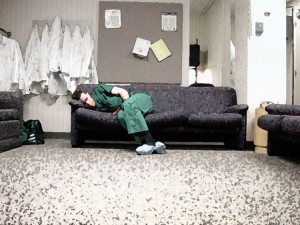In a recent post I explained the differences between the old ACGME duty hour restrictions and those implemented in July 2011. The main difference is that first year residents (i.e. ‘interns’ or PGY1 residents) are now limited to 16 hours shifts, with a mandatory 10 hour break between shifts. All residents are still limited to the 80 hour work week that has been in place for nearly 10 years (2003).
I heard about the new restrictions while I was a fourth year medical student. At first, the idea sounded fantastic, both for the resident and the patient. However, a few months into my internship and I am already starting to see some potential downsides to these regulations. Lets look first from an intern’s perspective.
- The new duty hour restrictions leave no option to residencies but to start a large night float operation. This means that a large subset of your interns will be working nights for 2-4 week intervals. Rather than just being on call every fourth night, interns must now switch from nights to days to nights frequently.
- With the 80 hour work week remaining intact, but the shift limit being decreased to 16 hours, you can imagine that interns are not working any less, they are just working more shifts. So, rather than having ‘post call’ days, or a ‘golden weekend’ (Saturday and Sunday off), I am in the hospital nearly every day.
- In addition to the hours, there is a HUGE loss in patient continuity. I feel like I never know the patients I am covering. This is detrimental to the doctor-patient relationship and also to my learning.
Now, from the patient’s perspective: imagine you come to the hospital with acute pancreatitis. You are admitted by the night float intern and resident, who sign you off in the morning to the primary team and never see you again. You are taken care of by the primary team intern and resident during the day, who then sign you off to a totally different intern and resident when they leave for the day. This is the normal cycle in most US teaching hospitals in 2011. A patient will have been taken care of by 3 different interns and 3 different residents in their first 24 hours of admission. There is no continuity, and a very high rate of patient ‘hand-offs’.
I do now know the answer, but I know what question we all must answer. If you are a patient in the hospital who all of the sudden develops septic shock at 9:00am in the morning, who would you rather rush into the room?
- An intern who has been working for 28 hours straight who knows you well but is very tired, or
- An intern who had a full night’s rest but doesn’t know you from Adam and has only heard one sentence about you?
Which would you choose?







 My name is Andrew and I am a first year resident training to be an ophthalmologist. I created ShortWhiteCoats to provide medical students, residents, and the public with all the information I spent so many hours looking for during medical school.
My name is Andrew and I am a first year resident training to be an ophthalmologist. I created ShortWhiteCoats to provide medical students, residents, and the public with all the information I spent so many hours looking for during medical school.








